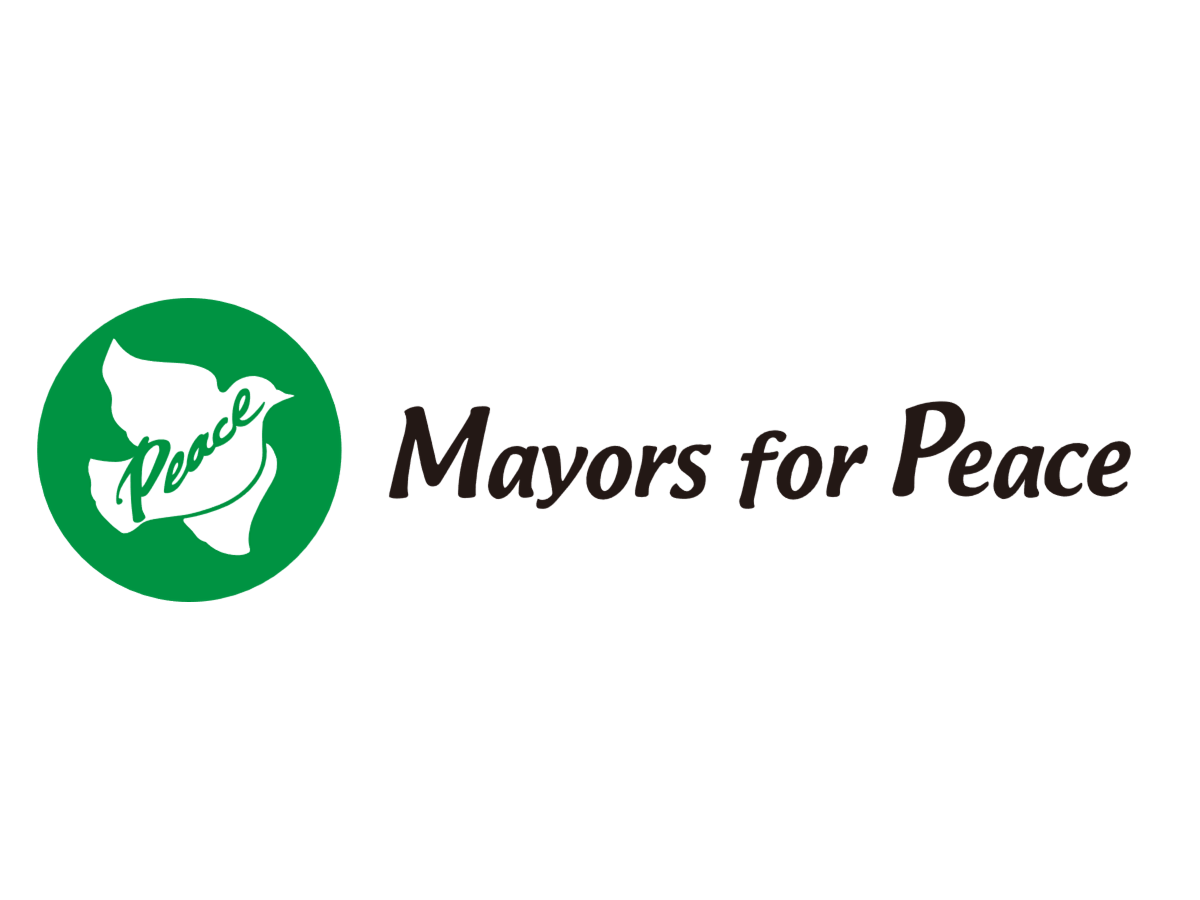In August, 1945, the first nuclear weapons ever used in human history caused an indescribable catastrophe for the cities of Hiroshima and Nagasaki. Even now a number of A-bomb survivors are still suffering physically, psychologically, and socially from various after-effects. Nevertheless, nuclear weapons have not been abolished; they continue to threaten human existence. Our goal is to maintain environments that enable citizens to lead safe, cultural lives, and to contribute to the attainment of lasting world peace. To this end, we pledge to make every effort to create an inter-city solidarity transcending national boundaries and ideological differences in order to achieve the total abolition of nuclear weapons and avert the recurrence of the Hiroshima and Nagasaki tragedies.
We agree to the intent of the “Program to Promote Solidarity of Cities towards the Total Abolition of Nuclear Weapons” proposed by Hiroshima and Nagasaki. Furthermore, we hope that the “World Conference of Mayors for Peace through Inter-city Solidarity,” which held its first session in August of 1985, shall become a permanent organization. Accordingly, we do hereby establish an organization to be known as the “Mayors for Peace”.
CHAPTER I
PURPOSES AND PRINCIPLES
Purposes
ARTICLE 1
- The Purposes of the “Mayors for Peace” are to contribute to the attainment of lasting world peace by arousing concern among citizens of the world for the total abolition of nuclear weapons through close solidarity among all cities which agree to the “Program to Promote Solidarity of Cities towards the Total Abolition of Nuclear Weapons” as well as by striving to solve vital problems for the human race such as starvation and poverty, the plight of refugees, human rights abuses, and environmental degradation. (Cities which agree to the “Program to Promote Solidarity of Cities towards the Total Abolition of Nuclear Weapons” are hereinafter cited as solidarity cities.)
Principles
ARTICLE 2
The Organization and solidarity cities, in pursuit of the Purposes stated in Article 1, shall act in accordance with the following Principles;
- (a) The Organization shall be based on friendship, goodwill, and respect for the actual conditions of Solidarity Cities.
- (b) The Organization shall devote itself to the total abolition of nuclear weapons and the attainment of lasting world peace, and to the solution of such problems as starvation, poverty, the plight of refugees, human rights abuses, and environmental degradation in cooperation with the United Nations, a major peace-keeping organization in the world.
- (c) Solidarity Cities shall work for the development of friendly relationships and bonds of solidarity among cities on the basis of mutual understanding and shall act in good faith for the attainment of the Purposes in accordance with the present Covenant.
- (d) Solidarity Cities shall seek to increase global awareness of the “Spirit of Hiroshima and Nagasaki” by introducing and expanding the idea of Inter-City Solidarity.
CHAPTER II
ACTIVITIES
Details of the Activities
ARTICLE 3
The Organization, in pursuit of the Purposes stated in Article 1, shall be engaged in the following activities;
- (a) To introduce and expand the idea of inter-city solidarity to worldwide cities.
- (b) To make an appeal for the total abolition of nuclear weapons and general and complete disarmament to related organizations such as the United Nations.
- (c) To coordinate the following activities promoted by Solidarity Cities.
- (i) Solidarity Cities shall hold gatherings and events devoted to the cause of disarmament and peace, and/or to the solution of such problems as starvation, poverty, the plight of refugees, human rights abuses, and environmental degradation and shall send copies of any statement, resolution, or proclamation, associated with these events, to other Solidarity Cities.
- (ii) Solidarity cities shall transmit messages advocating the total abolition of nuclear weapons and general and complete disarmament to the Secretary-General and the President of the General Assembly of the United Nations during the United Nations Disarmament Week. In addition, copies of the messages shall be exchanged with other Solidarity Cities.
- (iii) Solidarity Cities that sponsor workshops or meetings on peace, disarmament, and security issues, and/or the solution of such problems as starvation, poverty, the plight of refugees, human rights abuses, and environmental degradation shall send relevant pamphlets, books, and materials reporting these results to other Solidarity Cities.
- (iv) Solidarity Cities that publish or obtain materials, brochures, or books related to peace, disarmament, and security issues, and/or to the solution of such problems as starvation, poverty, the plight of refugees, human rights abuses, and environmental degradation shall bring them to the attention of other Solidarity Cities.
- (v) Bearing in mind the current international situation and the urgency and importance of nuclear disarmament, Solidarity Cities shall hold photographic exhibitions which describe and depict to citizens around the world the actual nature of the devastations wreaked by the atomic bombs on Hiroshima and Nagasaki.
- (vi) The cities of Hiroshima and Nagasaki shall cooperate by providing necessary exhibition photographs and introducing documentary films, slides, and books, that depict the disaster caused by the atomic bombings.
- (d) To sponsor and organize events as may be necessary to achieve the Purposes stated in the present Covenant.
CHAPTER III
EXECUTIVE OFFICIALS
Executive Officials
ARTICLE 4
- 1. Executive Officials of the Organization shall consist of: one President; an appropriate number of Vice-Presidents and Executive Members.
- 2. The President and the Vice-President shall be elected by Solidarity Cities.
- 3. The President shall supervise and represent the Organization, and shall chair the Conference.
- 4. The Vice-President shall assist the President. In case of the inability of the President to carry out the duties of the office, the Vice-President shall fulfill the duties of the President.
- 5. The Executive Members shall be appointed from Solidarity Cities by the President with regional conditions taken into consideration.
- 6. The Executive Members shall assist the President and the Vice-President and shall act for the smooth management of the Organization.
Term of Office
ARTICLE 5
- 1. The term of office of the Executive Officials shall be until such time that new Executive Officials are elected at a succeeding General Conference. Each office shall be open to reelection.
- 2. Whatever the stipulations of previous clauses, if a member-city mayor holding an elected office resigns or retires his or her mayoralty, the succeeding mayor shall assume said office. In such case, the succeeding officer’s term shall last as long as the original term of the retiring or resigning officer.
CHAPTER IV
CONFERENCE
General Conference and
Executive Conference
ARTICLE 6
The Organization shall hold a General Conference and an Executive Conference.
General Conference
ARTICLE 7
- 1. The General Conference shall meet every four years in principle.
- 2. The General Conference shall be held to achieve the Purposes stated in Article 1 and to decide and approve relevant questions.
Executive Conference
ARTICLE 8
- 1. The Executive Conference shall consist of the Executive Officials and shall meet when the occasion arises.
- 2. The Executive Conference shall be authorized to make emergency decisions for the Organization in place of the General Conference with the exception of electing the President and the Vice-President.
Convocation
ARTICLE 9
The General Conference or the Executive Conference shall be convoked by the President.
Voting
ARTICLE 10
- 1. Each Solidarity City participating in the General Conference or the Executive Conference shall have one vote. In case of absence, each Solidarity City may delegate its vote by proxy to another participating city.
- 2. Decisions of the Conference on all questions shall be made by a simple majority vote of participating cities. In case of tie votes, the President shall cast a deciding vote.
- 3. When circumstances render it impossible to hold a Conference, decisions shall be made by votes conveyed in letters to the Secretariat from Solidarity Cities.
CHAPTER V
THE SECRETARIAT
Establishment of the Secretariat
ARTICLE 11
The Secretariat shall be established in the Hiroshima Peace Culture Foundation to operate the Organization.
Secretariat Staff
ARTICLE 12
- 1. The Secretariat shall be comprised of a Secretary General and Under-Secretary General, and support-staff.
- 2. The Chairperson of the Hiroshima Peace Culture Foundation shall serve as Secretary General.
- 3. The Executive Director of the Hiroshima Peace Culture Foundation shall serve as the Under-Secretary General.
- 4. The staff except the Secretary General and Under-Secretary General shall be appointed by the President.
- 5. The Under-Secretary General shall assist the Secretary General. In case of the inability of the Secretary General to carry out the duties of the office, or if the post is vacant, the Under-Secretary General shall fulfill the duties of the Secretary General.
- 6. The Secretary General shall preside over the duties of the Secretariat.
CHAPTER VI
SHARE OF EXPENSES
Expenses
ARTICLE 13
Expenses required to operate the Secretariat (ordinary expenditure) and expenses required to hold the Conference (extraordinary expenditure) shall be decided by the General Conference on the recommendation of the Executive Conference.
CHAPTER VII
MISCELLANEOUS PROVISIONS
Amendments
ARTICLE 14
Amendments to the present Covenant shall come into force upon adoption by a two-thirds majority of the participating cities at the General Conference.
Delegation
ARTICLE 15
Decisions required to operate the Secretariat, other than those stipulated in the present Covenant, shall be made by the President.
This covenant was executed on November 1, 1986.
Revised on October 16, 1991, effective the same day.
Revised on August 5, 2001, effective the same day.
Revised on August 4, 2013, effective on August 6, 2013.

